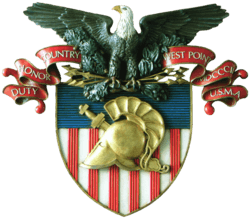René Edward De Russy
| René Edward De Russy | |
|---|---|
 Brig. Gen. René Edward de Russy | |
| Born |
February 22, 1789 Saint-Domingue (now Haiti) |
| Died |
November 23, 1865 (aged 76) San Francisco, California |
| Buried at | West Point Cemetery |
| Allegiance | United States of America |
| Service/branch |
United States Army Union Army |
| Years of service | 1812 - 1865 |
| Rank |
|
| Unit | United States Army Corps of Engineers |
| Commands held | Superintendent of the United States Military Academy |
René Edward De Russy (February 22, 1789 – November 23, 1865) was an engineer, military educator, and career United States Army officer who was responsible for erecting many Eastern United States coastal fortifications. He served as superintendent of the United States Military Academy and was promoted to brigadier general during the American Civil War.
Early life
René Edward De Russy was born in the French colony of Saint-Domingue (now Haiti) on February 22, 1789. Two years later, the De Russy family moved to Old Point Comfort, Virginia. At the age of 18, De Russy enrolled into the United States Military Academy at West Point, New York on March 20, 1807, and graduated on June 10, 1812, at the bottom of his class.
Military career
After West Point, De Russy worked as the assistant engineer for New York State’s defenses and helped to build Fort Montgomery, Rouses Point on the Canada–US border. In the late 1810s he became the Superintending Engineer of the defenses of New York Harbor. However, after that he was sent south to build forts along the Gulf of Mexico, from 1821 to 1825. In 1825 he returned to New York City where he continued to build the Harbor’s defenses, specifically Fort Hamilton. The Brooklyn Eagle reported that De Russy was the “engineer under whose direction Fort Hamilton was built, the corner stone of which was laid on June 11, 1825, and which was first garrisoned by troops on November 1, 1831.” During this stay in New York City De Russy inspected the construction of the New Utrecht Reformed Church in and built his home, which the Brooklyn Eagle referred to as “The Lookout” because it overlooked the harbor, situated as it was on the very top of the hill that became Dyker Heights, Brooklyn, New York.
On July 1, 1833 he became Superintendent of the United States Military Academy, in which he supervised for five years.[1] Thereafter, he was sent south again to build forts in Virginia and Delaware. Because of his extensive career, De Russy became a member of the Atlantic Coast Defense Board from 1849 until 1854, when he was sent to San Francisco, where he built military forts and aptly became a member of the Pacific Coast Defense Board. In 1857 he was sent back to the Atlantic Coast but returned to San Francisco in 1861; “he died while on active duty at San Francisco on November 23, 1865, aged 75 years, the oldest graduate of the Military Academy on active duty.” While in the military he rose to the rank of Brigadier General and invented the barbette depressing gun carriage. He is buried at the United States Military Academy Post Cemetery.
There are five Forts DeRussy in the United States. Fort DeRussy Military Reservation in Honolulu, two in Louisiana, one in Kentucky, and one in Washington, D.C. The latter four were all built during the American Civil War. All of the forts were named for two brothers, Lewis Gustave and René Edward De Russy. Lewis also graduated from the United States Military Academy in 1814. Lewis, as a colonel in the Confederate Army, was the oldest West Point graduate to serve on the Confederate side, while his older brother René served on the Union side.
De Russy's daughter Sara was the wife of Major General Arthur Murray. Their son was Major General Maxwell Murray.
See also
- Brooklyn Eagle
- Dyker Heights Historical Society
References
- ↑ "Civil War Defenses of Washington". National Park Service. Retrieved 2009-04-19.
External links
| Military offices | ||
|---|---|---|
| Preceded by Sylvanus Thayer |
Superintendents of the United States Military Academy 1833–1838 |
Succeeded by Richard Delafield |
